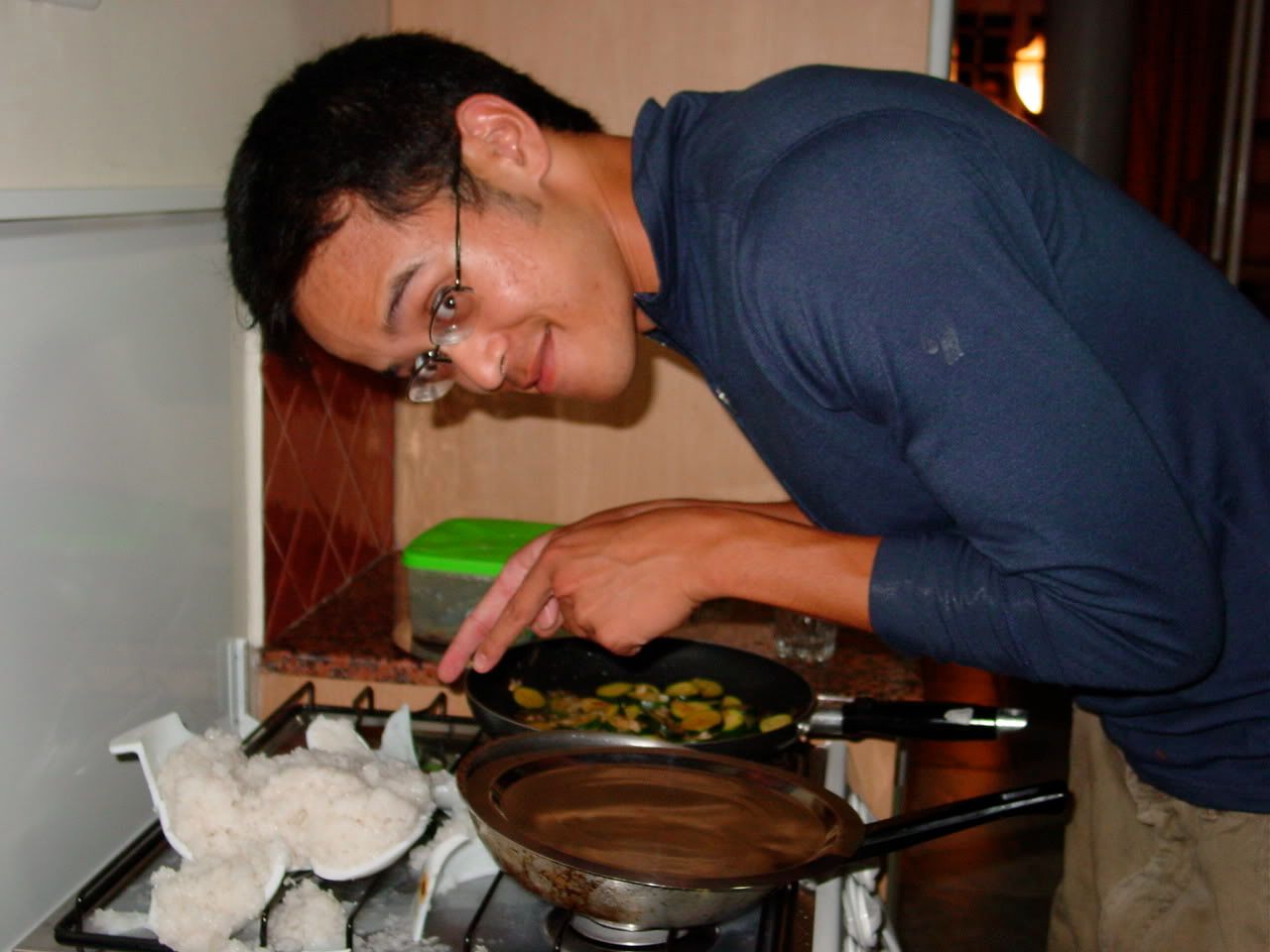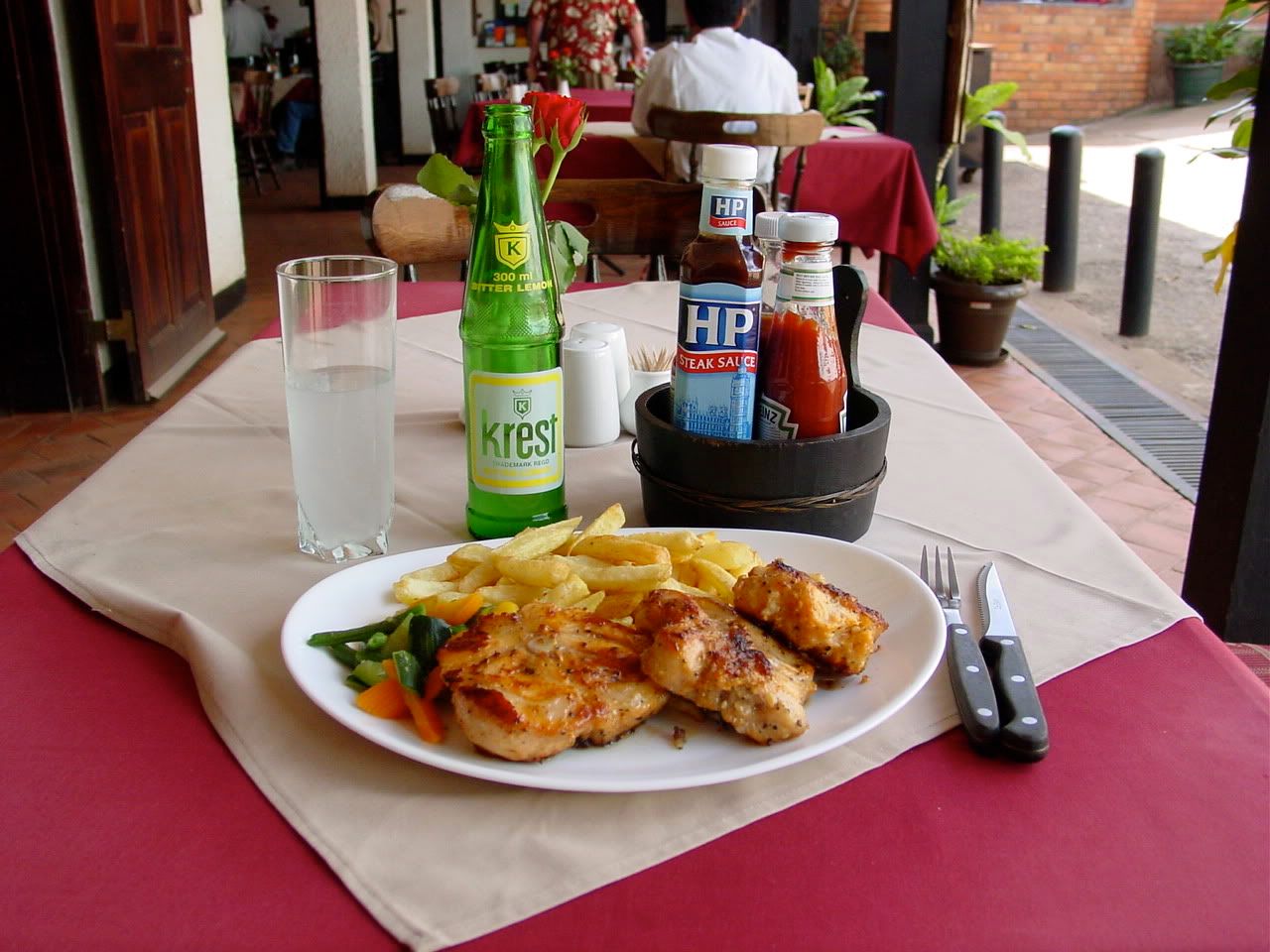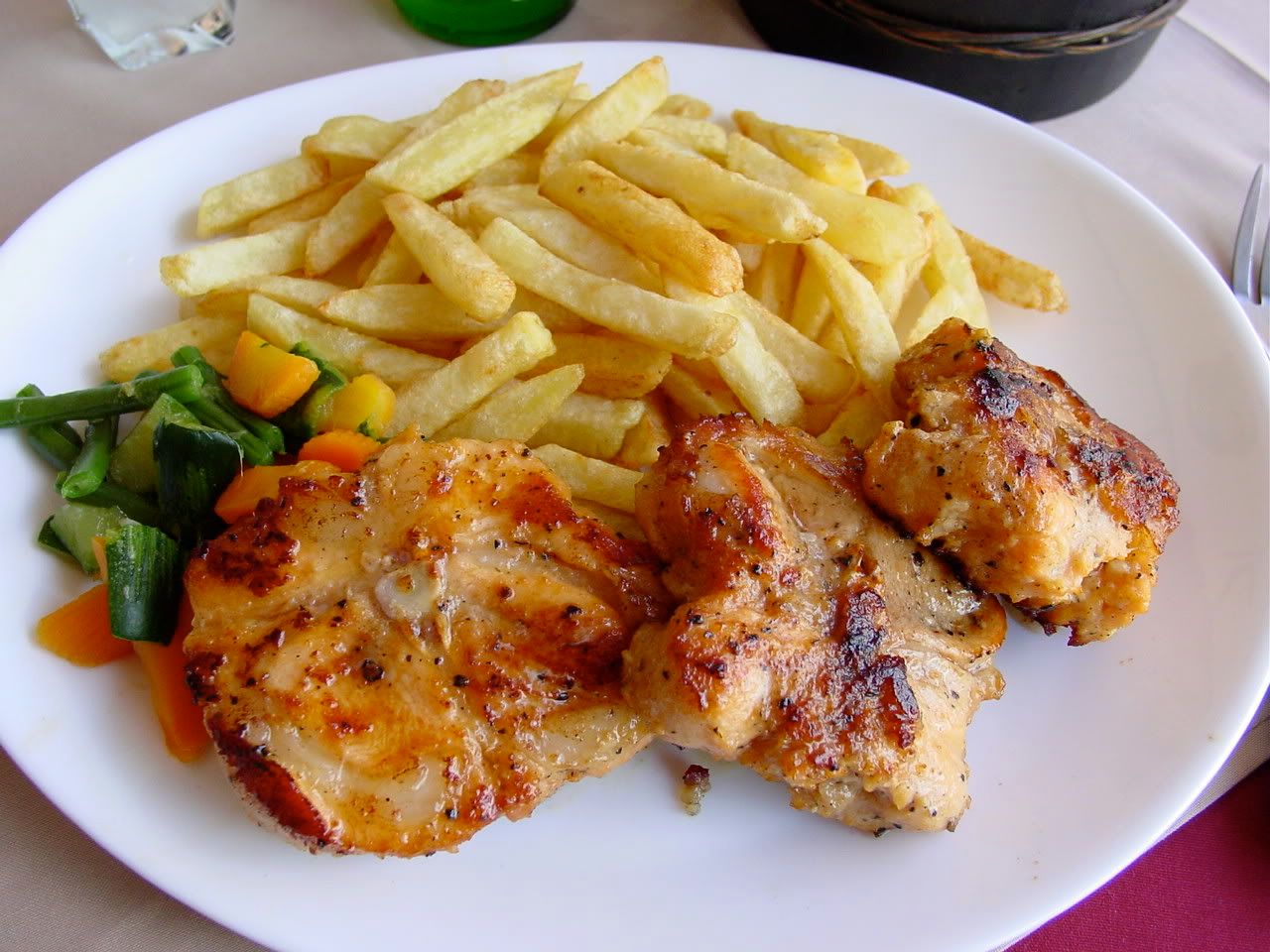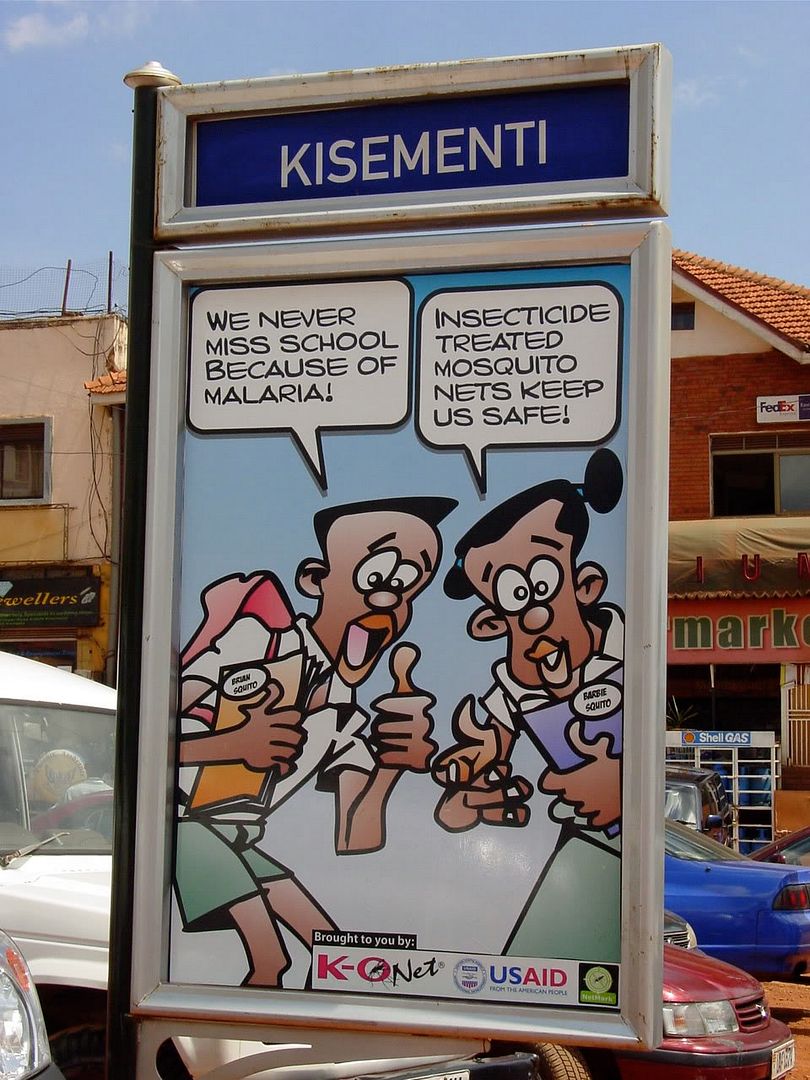Last Post From Uganda.
Today is Monday, and I leave for the states tomorrow night- it's been a good 2 months, a lot of work, play, and experiences.
I've learned a lot in the last 2 months- much of it to do with the practical difficulties of actually acquiring good quality data. The issues range from realizing the difficulty of collecting complete data on 1500 patients every month (from the clinic's point of view) to bringing the data back from the field. The analysis isn't as hard, but it's also something that I've learned a lot about this summer as well- Stata coding, and presentation of results. But as Sherlock Holmes says (reading the complete Sherlock Holmes tome at the moment), you can't build bricks without clay- and you can't build a house without bricks. If the data is bad, your foundation is rotten.
It's probably something that I didn't appreciate fully while I was doing my first year at Berkeley- the data sets were just there, and while I learned all the fancy techniques for analyzing data in my classes, the difficulty associated with getting good data and the limitations associated with it didn't cross my mind as strongly as it does now.
That in itself is a pretty valuable lesson I think- in my future, I'm anticipating seeing a lot of data, and it's good to have learned this lesson early- always question the quality of the data.
I haven't heard the full story from Apac yet, but Allen did mention that there was communication with the staff there while I was on vacation, and that apparently the entire staff knew of the filling in of the missing data after the fact- apparently Grant's request that 90% of the data be filled in was taken as an ultimatum, and they decided to meet that requirement in any way possible. Hopefully a solution to this will be found (either changing the way patients move through the surveillance system, or just accepting missing data).
On a different note, Sherlock Holmes might have made a pretty darn good Epidemiologist. At least, a few of his pieces of advice are pretty useful to keep in mind. His first good piece of advice is to not jump to conclusions, and don't form opinions until all the data/facts come in- he points out that this can lead to bias and ignoring of other possible explanations. His second piece of advice is that your conclusions can only be as good as your data, the output depends on the quality of the input.
The book is going pretty well, I'm about 300 pages in, and 1/3 to 1/4 done with the book- it's a pretty big tome.
This past weekend wasn't incredibly exciting, but a few interesting things happened.
While cooking rice, I exploded a ceramic pot. Pretty surprising, since the gas fire was on low, and the rice was pretty much done. Still ate the rice. Thanks for taking the picture Luisa!

Besides rice, I also ate this dish- guess what type of meat it is, I'll tell you at the bottom of the post.


USAID and a few other sponsors put up advertisements like this around the city:

On Sunday, Sam, Luisa, and I tried to go downtown to see a showing of Superman Returns, only to find that we were once again foiled by the lack of power. It was a rainy day, and Sam and Luisa decided to go back and wait in the house for the power to return (it never did) while I decided to just hang around, and try to make something out of the afternoon since I was downtown already.
I started to walk down towards Owino market, just to see how muddy the area had become with the day's rain, when I ran into a bunch of guys on the side of the street selling boxer shorts, socks, purses, and ties. I ended up sitting down with them and talking for about 2 hours.
One guy was from Ghana, and wanted me to be a businessman and send him purses and other cheap goods from China so he could sell them for me (everyone likes to ask where I'm from, and after saying "US" for a while, I got a few responses like "NO! You cannot be US. You are not white." So from then on, I started saying China, and everyone reacted even more positively than before...). Soon enough, I had 8-10 guys hanging around, talking about business and why I was here, and they tried to get me to sell their stuff to other mzungus. They all asked if I knew Jet Li, or Jackie Chan, or Sammo Hung- and it so happens that while I was doing wushu training in Beijing last summer, my coach Liu was students with Jet Li- when the Ugandan/Ghana guys heard this, they got really excited.
They really wanted to learn a lot of self-defense, and they had all sorts of mock sparring events with each other. From what they told me, it was pretty evident that they were used to street fights, and wanted to learn any tricks that they could use to defend themselves in a fight. Sadly, wushu is most definitely one of the least practical martial arts that exist for self defense... I might have to remedy that by learning some other style when I come back to Berkeley.
Every once in a while, the guys would see these yellow and green pickups drive near, and they grabbed their stuff and prepared to run for it- they explained that those were the equivalent of law enforcement, and that they would confiscate their goods if they didn't get away. I ended up helping move their shop to a new location after the rains stopped.
I did pick up a bit of Lugandan (which I promptly forgot the next day) and I taught them Chinese in return (what little I know). I also learned a little about how matatus are profitable- they make roughly 50k a day, and the owner of the vehicle gets around 40k a day, the driver gets a fixed 5k a day, and the conductor gets 3k. It seems like a small amount for the driver and conductor, especially since I talked to a boda driver the previous week, and he said he could make 20k a day roughly. Sam and Luisa speculated that the driver and conductor could probably skim off the top, or something like that.
I also learned that they all pretty uniformly disliked America because they thought that America liked to invade countries and arrest people. Surprisingly, they all really liked China! Their reasoning was that China gave them cheap goods (clothes, shoes, bags, cars, etc.) while products from the US and Europe were way too expensive for them. Not only did Chinese goods make life more affordable, apparently there are a lot of Chinese engineers and construction workers in the country. I do know that the Chinese built a huge stadium for Uganda, and they have built other things as well for Uganda, but I never ran into any of these Chinese people. However, the guys all asked why my English was so much better than the other Chinese peoples', and why I was so much taller than them, and why my eyes weren't as squinty as other Chinese peoples'. Haha. It does seem to suggest that there are a good number of Chinese people, but that I just haven't seen them yet.
Well, that's all the news I have left to tell. Uganda's been a great experience, and it's interesting to see how my feelings progressed- from paranoia the first week, to hanging out with strangers on the side of the street my last week. Hope you've all enjoyed the blog, and the pictures. I'm not really planning on updating the blog once I get into the States, but if enough people want me to, I might keep it going. Alternatively, if my thesis does end up being on malaria, there might be a revival in the near future. Thanks again all, and hope your summers were great.
P.S.- Those steaks are cross-sections of crocodile tail- it was more tender than good chicken, almost bordering on the softness and flakiness of fish. It was much fattier than fish or chicken, and resembled beef in that respect (thin layers of fat in the muscle). Really really tasty, and I ate it at "Sam's" restaurant, off of Kampala Road. I asked the waiter if they were from the wild or from the farm, and he said that there was a farm for them- it had 1,000 crocs at any one point, and that the crocs were used for food between the ages of 5-6 years. Big ones might be too tough I imagine, and the point was made that they would be pretty scary if they were older too.
I've learned a lot in the last 2 months- much of it to do with the practical difficulties of actually acquiring good quality data. The issues range from realizing the difficulty of collecting complete data on 1500 patients every month (from the clinic's point of view) to bringing the data back from the field. The analysis isn't as hard, but it's also something that I've learned a lot about this summer as well- Stata coding, and presentation of results. But as Sherlock Holmes says (reading the complete Sherlock Holmes tome at the moment), you can't build bricks without clay- and you can't build a house without bricks. If the data is bad, your foundation is rotten.
It's probably something that I didn't appreciate fully while I was doing my first year at Berkeley- the data sets were just there, and while I learned all the fancy techniques for analyzing data in my classes, the difficulty associated with getting good data and the limitations associated with it didn't cross my mind as strongly as it does now.
That in itself is a pretty valuable lesson I think- in my future, I'm anticipating seeing a lot of data, and it's good to have learned this lesson early- always question the quality of the data.
I haven't heard the full story from Apac yet, but Allen did mention that there was communication with the staff there while I was on vacation, and that apparently the entire staff knew of the filling in of the missing data after the fact- apparently Grant's request that 90% of the data be filled in was taken as an ultimatum, and they decided to meet that requirement in any way possible. Hopefully a solution to this will be found (either changing the way patients move through the surveillance system, or just accepting missing data).
On a different note, Sherlock Holmes might have made a pretty darn good Epidemiologist. At least, a few of his pieces of advice are pretty useful to keep in mind. His first good piece of advice is to not jump to conclusions, and don't form opinions until all the data/facts come in- he points out that this can lead to bias and ignoring of other possible explanations. His second piece of advice is that your conclusions can only be as good as your data, the output depends on the quality of the input.
The book is going pretty well, I'm about 300 pages in, and 1/3 to 1/4 done with the book- it's a pretty big tome.
This past weekend wasn't incredibly exciting, but a few interesting things happened.
While cooking rice, I exploded a ceramic pot. Pretty surprising, since the gas fire was on low, and the rice was pretty much done. Still ate the rice. Thanks for taking the picture Luisa!

Besides rice, I also ate this dish- guess what type of meat it is, I'll tell you at the bottom of the post.


USAID and a few other sponsors put up advertisements like this around the city:

On Sunday, Sam, Luisa, and I tried to go downtown to see a showing of Superman Returns, only to find that we were once again foiled by the lack of power. It was a rainy day, and Sam and Luisa decided to go back and wait in the house for the power to return (it never did) while I decided to just hang around, and try to make something out of the afternoon since I was downtown already.
I started to walk down towards Owino market, just to see how muddy the area had become with the day's rain, when I ran into a bunch of guys on the side of the street selling boxer shorts, socks, purses, and ties. I ended up sitting down with them and talking for about 2 hours.
One guy was from Ghana, and wanted me to be a businessman and send him purses and other cheap goods from China so he could sell them for me (everyone likes to ask where I'm from, and after saying "US" for a while, I got a few responses like "NO! You cannot be US. You are not white." So from then on, I started saying China, and everyone reacted even more positively than before...). Soon enough, I had 8-10 guys hanging around, talking about business and why I was here, and they tried to get me to sell their stuff to other mzungus. They all asked if I knew Jet Li, or Jackie Chan, or Sammo Hung- and it so happens that while I was doing wushu training in Beijing last summer, my coach Liu was students with Jet Li- when the Ugandan/Ghana guys heard this, they got really excited.
They really wanted to learn a lot of self-defense, and they had all sorts of mock sparring events with each other. From what they told me, it was pretty evident that they were used to street fights, and wanted to learn any tricks that they could use to defend themselves in a fight. Sadly, wushu is most definitely one of the least practical martial arts that exist for self defense... I might have to remedy that by learning some other style when I come back to Berkeley.
Every once in a while, the guys would see these yellow and green pickups drive near, and they grabbed their stuff and prepared to run for it- they explained that those were the equivalent of law enforcement, and that they would confiscate their goods if they didn't get away. I ended up helping move their shop to a new location after the rains stopped.
I did pick up a bit of Lugandan (which I promptly forgot the next day) and I taught them Chinese in return (what little I know). I also learned a little about how matatus are profitable- they make roughly 50k a day, and the owner of the vehicle gets around 40k a day, the driver gets a fixed 5k a day, and the conductor gets 3k. It seems like a small amount for the driver and conductor, especially since I talked to a boda driver the previous week, and he said he could make 20k a day roughly. Sam and Luisa speculated that the driver and conductor could probably skim off the top, or something like that.
I also learned that they all pretty uniformly disliked America because they thought that America liked to invade countries and arrest people. Surprisingly, they all really liked China! Their reasoning was that China gave them cheap goods (clothes, shoes, bags, cars, etc.) while products from the US and Europe were way too expensive for them. Not only did Chinese goods make life more affordable, apparently there are a lot of Chinese engineers and construction workers in the country. I do know that the Chinese built a huge stadium for Uganda, and they have built other things as well for Uganda, but I never ran into any of these Chinese people. However, the guys all asked why my English was so much better than the other Chinese peoples', and why I was so much taller than them, and why my eyes weren't as squinty as other Chinese peoples'. Haha. It does seem to suggest that there are a good number of Chinese people, but that I just haven't seen them yet.
Well, that's all the news I have left to tell. Uganda's been a great experience, and it's interesting to see how my feelings progressed- from paranoia the first week, to hanging out with strangers on the side of the street my last week. Hope you've all enjoyed the blog, and the pictures. I'm not really planning on updating the blog once I get into the States, but if enough people want me to, I might keep it going. Alternatively, if my thesis does end up being on malaria, there might be a revival in the near future. Thanks again all, and hope your summers were great.
P.S.- Those steaks are cross-sections of crocodile tail- it was more tender than good chicken, almost bordering on the softness and flakiness of fish. It was much fattier than fish or chicken, and resembled beef in that respect (thin layers of fat in the muscle). Really really tasty, and I ate it at "Sam's" restaurant, off of Kampala Road. I asked the waiter if they were from the wild or from the farm, and he said that there was a farm for them- it had 1,000 crocs at any one point, and that the crocs were used for food between the ages of 5-6 years. Big ones might be too tough I imagine, and the point was made that they would be pretty scary if they were older too.

0 Comments:
Post a Comment
<< Home